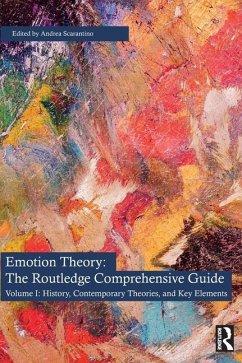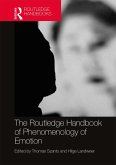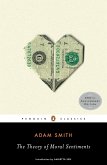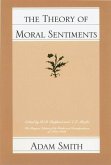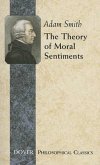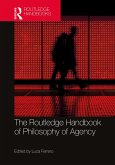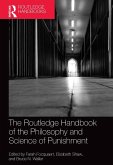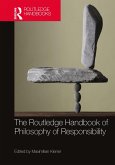Emotion Theory: The Routledge Comprehensive Guide is the first interdisciplinary reference resource which authoritatively takes stock of the progress made both in the philosophy of emotions and in affective science from Ancient Greece to today. A two-volume landmark publication, it provides an overview of emotion theory unrivaled in terms of its comprehensiveness, accessibility and systematicity.
Comprising 62 chapters by 101 leading emotion theorists in philosophy, classics, psychology, biology, psychiatry, neuroscience and sociology, the collection is organized as follows:
Volume I:
Part I: History of Emotion Theory (10 chapters)Part II: Contemporary Theories of Emotions (10 chapters)Part III: The Elements of Emotion Theory (7 chapters)
Volume II:
Part IV: Nature and Functions of 35 Specific Emotions (22 chapters)Part V: Challenges Facing Emotion Theory (13 chapters)Special Elicitors of EmotionsEmotions and Their Relations to Other Elements of Mental ArchitectureEmotions in Children, Animals and GroupsNormative Aspects of Emotions
Most of the major themes of contemporary emotion theory are covered in their historical, philosophical, and scientific dimensions. This collection will be essential reading for students and researchers in philosophy, psychology, neuroscience, sociology, anthropology, political science, and history for decades to come.
Comprising 62 chapters by 101 leading emotion theorists in philosophy, classics, psychology, biology, psychiatry, neuroscience and sociology, the collection is organized as follows:
Volume I:
Part I: History of Emotion Theory (10 chapters)Part II: Contemporary Theories of Emotions (10 chapters)Part III: The Elements of Emotion Theory (7 chapters)
Volume II:
Part IV: Nature and Functions of 35 Specific Emotions (22 chapters)Part V: Challenges Facing Emotion Theory (13 chapters)Special Elicitors of EmotionsEmotions and Their Relations to Other Elements of Mental ArchitectureEmotions in Children, Animals and GroupsNormative Aspects of Emotions
Most of the major themes of contemporary emotion theory are covered in their historical, philosophical, and scientific dimensions. This collection will be essential reading for students and researchers in philosophy, psychology, neuroscience, sociology, anthropology, political science, and history for decades to come.
"This is an astonishingly comprehensive and useful work of reference that succeeds as never before in encapsulating the history, typology, diversity, and utility of approaches to emotion theory in a wide range of disciplines. Emotion researchers constantly run the risk allowing themselves to be confined within their own specialisms and research cultures. Scarantino's collection offers students of emotion at all levels of experience a way out of their disciplinary silos and into new and exciting avenues of research." - Douglas Cairns, University of Edinburgh
"Emotion Theory: The Routledge Comprehensive Guide is an authoritative yet engaging handbook on emotion, giving insights into both the history and modern cutting-edge perspectives on the field. These magisterial two volumes, edited by Andrea Scarantino, bring together the best contemporary psychologists and philosophers of emotion, writing from many different theoretical positions. Whether you are interested in a particular emotion, a particular emotion theory, or how to think more generally about emotions, Emotion Theory will be an invaluable guide." - Kent Berridge, University of Michigan
"Emotion Theory: The Routledge Comprehensive Guide is a towering achievement. Its breadth is manifested both in the variety of the scientific disciplines represented-philosophy, classics, history, psychology, biology, psychiatry, neuroscience and sociology-and in the theoretical perspectives explored in its 62 Chapters. One would be hard pressed to think of an idea or problem about emotions that is not discussed. Editor Andrea Scarantino recruited 101 leading researchers and rising stars to cover a comprehensive range of scientific and philosophical approaches. And while he seems to have prevailed on them all to demystify technical terms and write lucidly enough to be read with pleasure by non-specialists, experts in emotion research will also find something to learn from every essay. The book could be used In a course on Emotion Science or Philosophy of Emotions in many ways, such as surveying the theories and approaches figuring in current debates, taking a historical perspective on the field as a whole, or zooming in for a more in-depth look at any of 35 specific emotions ranging from anxiety and disgust, through lust, sadness and depression, to saudade and Schadenfreude." - Ronald de Sousa, University of Toronto
"All one would want to know about emotion theory in philosophy and affective sciences can be found in the two volumes of this comprehensive, interdisciplinary publication - an extraordinary achievement by the 101 authors and particularly the editor. Andrea Scarantino has done an extremely impressive job in planning the contents and identifying expert authors. In addition, he has worked intensively with the authors to fine-tune their contributions. The result is a milestone for the field of emotion, an ideal basis to finally achieve some degree of theory convergence in a field that has a long history of being beset by theoretical controversies." - Klaus Scherer, University of Geneva and University of Munich
"Emotion Theory: The Routledge Comprehensive Guide is an authoritative yet engaging handbook on emotion, giving insights into both the history and modern cutting-edge perspectives on the field. These magisterial two volumes, edited by Andrea Scarantino, bring together the best contemporary psychologists and philosophers of emotion, writing from many different theoretical positions. Whether you are interested in a particular emotion, a particular emotion theory, or how to think more generally about emotions, Emotion Theory will be an invaluable guide." - Kent Berridge, University of Michigan
"Emotion Theory: The Routledge Comprehensive Guide is a towering achievement. Its breadth is manifested both in the variety of the scientific disciplines represented-philosophy, classics, history, psychology, biology, psychiatry, neuroscience and sociology-and in the theoretical perspectives explored in its 62 Chapters. One would be hard pressed to think of an idea or problem about emotions that is not discussed. Editor Andrea Scarantino recruited 101 leading researchers and rising stars to cover a comprehensive range of scientific and philosophical approaches. And while he seems to have prevailed on them all to demystify technical terms and write lucidly enough to be read with pleasure by non-specialists, experts in emotion research will also find something to learn from every essay. The book could be used In a course on Emotion Science or Philosophy of Emotions in many ways, such as surveying the theories and approaches figuring in current debates, taking a historical perspective on the field as a whole, or zooming in for a more in-depth look at any of 35 specific emotions ranging from anxiety and disgust, through lust, sadness and depression, to saudade and Schadenfreude." - Ronald de Sousa, University of Toronto
"All one would want to know about emotion theory in philosophy and affective sciences can be found in the two volumes of this comprehensive, interdisciplinary publication - an extraordinary achievement by the 101 authors and particularly the editor. Andrea Scarantino has done an extremely impressive job in planning the contents and identifying expert authors. In addition, he has worked intensively with the authors to fine-tune their contributions. The result is a milestone for the field of emotion, an ideal basis to finally achieve some degree of theory convergence in a field that has a long history of being beset by theoretical controversies." - Klaus Scherer, University of Geneva and University of Munich

